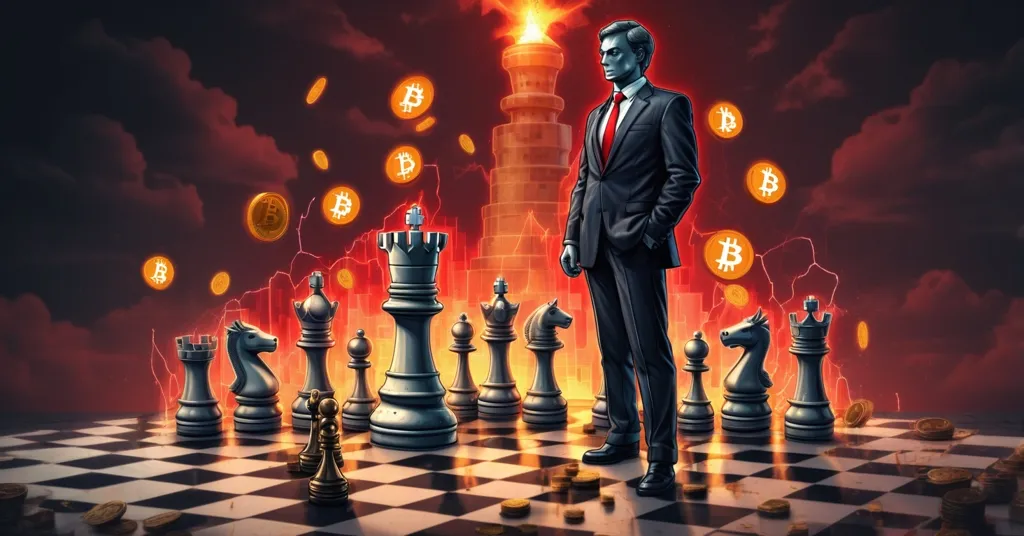Trump’s Bitcoin Reserve Plan: Economic Revolution or Dollar Disaster?

Trump’s Bitcoin Gamble: Innovation or Economic Peril for the US Dollar?
President Donald Trump’s bold pivot toward Bitcoin and cryptocurrency as a national strategy has sparked a heated clash between techno-optimists and traditional economists, with the US dollar’s dominance hanging in the balance. As plans for a Strategic Bitcoin Reserve take shape alongside state-level crypto experiments, the promise of financial disruption collides with warnings of economic chaos.
- Trump’s Vision: Pushes Bitcoin as a job creator and dollar pressure reliever via a Strategic Bitcoin Reserve.
- Harsh Criticism: Economist Peter Schiff warns it threatens the dollar’s global reserve status.
- Risky Business: Volatility looms over public funds as states like Texas dive into crypto.
- Ethical Shadows: Trump family crypto profits raise conflict-of-interest red flags.
- Global Stakes: US moves could spark a worldwide race for crypto dominance.
Trump’s Bitcoin Policy 2025: A New Financial Frontier?
Donald Trump has thrown his weight behind Bitcoin with an Executive Order signed in March 2025, aiming to establish a Strategic Bitcoin Reserve and a broader U.S. Digital Asset Stockpile. His pitch is clear: embracing cryptocurrency can drive job growth in tech sectors and lessen reliance on an overburdened US dollar, potentially positioning America as the “crypto capital of the world.” With Bitcoin’s price jumping over 10% after the announcement to a high of $95,043 before settling around $92,500, the market’s initial reaction suggests plenty of enthusiasm. Trump’s narrative leans on Bitcoin’s reputation as “digital gold”—a reference to its fixed supply of 21 million coins and robust security through a decentralized network of miners, making it a potential shield against inflation.
For those new to the space, a national reserve typically holds assets like gold or oil to stabilize a country’s economy or back its currency. Integrating Bitcoin—a digital asset born in 2009 as a peer-to-peer alternative to fiat money—into such a framework marks a radical shift. It’s a bet on decentralization, the idea that power over money shouldn’t rest solely with governments or banks. But this isn’t just about tech; it’s politics, economics, and personal stakes rolled into one messy package.
Economic Risks: Peter Schiff’s Dollar Warning
Not everyone is cheering from the sidelines. Economist Peter Schiff, a long-time Bitcoin detractor, has unleashed a scathing critique of Trump’s strategy. In a post on X dated June 28, 2025, he argued:
“Selling dollars to buy Bitcoin puts added pressure on the dollar. Also, wasting resources on Bitcoin is harmful to our country.”
Schiff’s concern centers on the US dollar’s status as the world’s reserve currency—a position that underpins global trade and American economic power. He believes prioritizing Bitcoin could erode demand for the dollar, signaling weakness at a time when geopolitical and economic challenges already loom large, as noted in a recent economic analysis. However, Schiff’s attack slightly misfires on the details. The White House has clarified that the Strategic Bitcoin Reserve won’t involve direct dollar sales but will instead be funded by Bitcoin seized through criminal and civil forfeitures—think drug busts or fraud cases. Past mismanagement of these seized assets has already cost taxpayers over $17 billion due to poorly timed sales, a fact that underscores the need for a coherent policy but also highlights the gamble of holding a volatile asset.
Even without direct dollar dumping, the symbolic shift matters. If nations or institutions perceive the US as hedging with Bitcoin, confidence in the dollar could still wane, a concern echoed in discussions on potential risks to the US dollar. On the flip side, pro-crypto voices like Caitlin Long, a blockchain advocate and founder of Custodia Bank, argue that Bitcoin in reserves could modernize financial systems, offering a hedge against fiat devaluation. This isn’t a black-and-white issue—while Schiff sees a threat, others see an overdue evolution, though the risks of price swings can’t be ignored.
State-Level Gambles: Texas and Florida Roll the Dice
The federal push isn’t happening in isolation. At least ten US states, including Texas and Florida, are jumping into the crypto pool by allocating public funds to hold digital assets on their balance sheets. Texas, with its pro-mining laws that have attracted major Bitcoin mining operations, reportedly holds millions in BTC as of mid-2025. Florida, meanwhile, has a blockchain task force driving adoption, aiming to position itself as a crypto-friendly hub. This isn’t just pocket change—it’s taxpayer money now tied to an asset class known for wild price swings.
For the uninitiated, volatility in cryptocurrency means rapid, often brutal fluctuations in value. A 30% surge in Bitcoin’s price during 2025 sounds like a win—until a 20% crash wipes out gains in days, triggered by anything from regulatory news to a whale dumping coins. States betting on crypto are essentially strapping their budgets to a financial bungee jump, with volatility concerns highlighted in various case studies. If prices tank, local economies could feel the sting, raising questions about whether public funds should be exposed to such speculative assets. Yet, the counterargument holds allure: early adoption could yield massive returns and cement these states as innovation leaders if crypto’s upward trajectory continues.
Ethical Red Flags: Trump Family Crypto Ventures
Then there’s the stink of potential conflicts of interest that even pro-Bitcoin folks can’t ignore. Trump Media, a private venture linked to the president, has reportedly raised $2.3 billion through stock offerings and convertible notes—loans that can convert into company shares—to build its own Bitcoin treasury. Meanwhile, World Liberty Financial, another Trump family business, secured a $100 million investment from Aqua 1 to expand into decentralized finance (DeFi), a blockchain sector that cuts out traditional banks by offering lending, trading, and more via smart contracts. Critics claim the family has netted over $1 billion from crypto activities, as explored in reports about Trump family ventures in crypto, though hard numbers remain elusive.
It gets weirder. A White House event for holders of the “TRUMP” meme coin—a gimmicky cryptocurrency tied to the president’s brand—saw attendees fork over nearly $150 million just for dinner seats. If that’s not a pay-to-play crypto circus, what is? Worse, whispers of insider trading swirl around a $200 million, 50x leveraged bet on Bitcoin and Ethereum placed hours before Trump’s reserve announcement. For clarity, a leveraged bet means borrowing heavily to amplify gains—or losses—making it a high-stakes gamble. Investor Mike Alfred sarcastically pointed fingers at Trump’s inner circle, while questions linger about David Sacks, Trump’s AI and crypto czar, whose past investments via Craft Ventures overlap with reserve assets. Sacks insists he’s divested personal holdings, but the optics are grim.
Let’s call this what it is: a potential grift that distracts from Bitcoin’s real value as a decentralized force. Political power shouldn’t be a ticket to personal profit, especially when public policy is at stake. That said, Bitcoin’s promise isn’t tethered to any one actor—its strength lies in its network, not in who’s shilling it. The challenge is ensuring this tech isn’t derailed by greed or regulatory backlash fueled by such controversies.
Community Clash: Bitcoin Maximalists vs. Altcoin Inclusion
Within the crypto world, Trump’s policy has ignited a philosophical fire. Bitcoin maximalists—those who view BTC as the only true decentralized currency—were initially furious when early announcements seemed to snub Bitcoin for altcoins like XRP, Solana (SOL), and Cardano (ADA) in the broader Digital Asset Stockpile. Coinbase CEO Brian Armstrong pushed for a Bitcoin-only reserve, citing its proven track record and near-impenetrable network security thanks to its proof-of-work consensus mechanism. One analyst, dubbed The Bitcoin Therapist, quipped that including altcoins was so absurd it might turn even Peter Schiff into a Bitcoin maxi.
Why the altcoin push? Each brings something unique: Solana offers lightning-fast transactions ideal for DeFi apps; XRP focuses on cross-border payments; Cardano emphasizes scalability and sustainability. Ethereum itself surged 15% on the news, climbing from $2,216 to $2,376, reflecting market approval of diversification. Still, Bitcoin’s first-mover advantage, massive mining network, and resilience over 15 years make it the safer bet for reserves in many eyes, a sentiment shared in community discussions on Bitcoin policy impacts. This tension—purity versus pragmatism—mirrors broader debates about what decentralization should look like. As a Bitcoin-leaning voice, I’ll say it: altcoins have their niches, but BTC’s unmatched security is the bedrock of this revolution.
Global Implications: A Race for Crypto Supremacy?
Zooming out, Trump’s crypto gamble could ripple far beyond US borders. If America cements itself as a first-mover in national crypto reserves, it might force other nations to play catch-up. Could China, despite its crypto bans, pivot to counter with digital yuan integrations or state-backed blockchain plays? Might the EU accelerate its own digital asset frameworks? Such moves could turbocharge global adoption, aligning with the spirit of effective accelerationism—pushing tech forward at breakneck speed to upend outdated systems, as detailed in analyses of Trump’s cryptocurrency policies.
But there’s a flip side. If Bitcoin craters, dragging public funds down with it, the fallout could discredit crypto on a world stage, emboldening skeptics and regulators. Worse, if political motives hijack the narrative, turning reserves into populist pawns rather than strategic assets, the dream of financial sovereignty could morph into just another centralized power grab. The stakes aren’t just domestic—they’re a global chess match, with decentralization itself on the line, a perspective reinforced by overviews like the one on Strategic Bitcoin Reserve details and further insights into Trump’s Bitcoin support.
Key Takeaways and Questions for the Crypto Community
- Is Trump’s Bitcoin push about genuine innovation or political theater?
The Strategic Bitcoin Reserve positions the US as a potential crypto leader, but Trump family business ties and insider trading allegations hint at personal gain and voter pandering over pure policy. - Does holding Bitcoin in national reserves threaten the US dollar?
Peter Schiff warns it could erode fiat confidence, though funding via forfeitures avoids direct dollar sales; still, the symbolic shift toward BTC might signal weakness to global markets. - What risks come with tying public funds to crypto volatility?
Bitcoin’s price swings could gut state and federal reserves in a downturn, risking taxpayer money on an asset with no guaranteed stability—a high-stakes roll of the dice. - Can altcoins in the stockpile coexist with Bitcoin’s dominance?
Diversification makes sense for specific use cases, but it frustrates maximalists who see Bitcoin as the only proven decentralized store of value, exposing deeper ideological rifts. - Do ethical concerns around Trump’s crypto ties undermine adoption?
Not ultimately—Bitcoin’s value transcends individuals—but the whiff of corruption could spur regulatory crackdowns, slowing mainstream trust and progress if not addressed. - How might US crypto reserves impact global adoption?
Leading the charge could inspire other nations to follow, accelerating crypto’s rise, though a market crash or political misuse risks tarnishing the tech’s reputation worldwide.
Trump’s Bitcoin bet encapsulates the chaotic brilliance of cryptocurrency—challenging centralized control, promising financial freedom, and shaking the foundations of money itself. Yet, the pitfalls are glaring: economic uncertainty, ethical quagmires, and the ever-looming threat of a market implosion. As champions of decentralization, we’re all in on Bitcoin’s potential to redefine the future, but let’s not drink the Kool-Aid blindfolded. This is a tightrope walk between revolution and recklessness, and the crypto community must keep its eyes wide open to ensure politics and profit don’t derail the destination.



